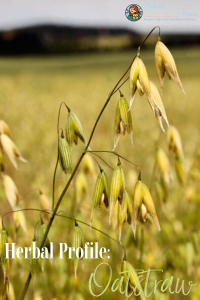By Sarena-Rae Santos, Natural Health Blogger
What is Oatstraw?
Oatstraw is sometimes referred to as common oat, groats, herb oats, oatgrass, oats, wild oats, or its botanical name Avena sativa. It grows in moderate temperatures, such as in Northern Europe and Northern America (1). Oatstraw can be identified by its hollow stems, solid joints, and grass-like structure. Some oatstraw species produce pods, also referred to as Milky Oat tops (2).
Health Benefits of Oatstraw
Research has indicated that 800-1,600 mg daily is an adequate dosage, which is a very allopathic way of thinking. Herbal dosages vary depending on individual needs. For instance, when it comes to medicinal herbs, a lot less is probably enough (again, everyone is different). But a higher dose can be used safely with nutritive herbs like this one.
Rich in Nutrients
Oats are seeds primarily used for nutritional purposes and are often consumed as an infusion. These seeds are highly nutritious and known for their fiber, folate, niacin, calcium, iron, magnesium, phosphorus, potassium, and more (3). Their stems (oatstraw) are also highly nutritious. Oatstraw is rich in calcium, potassium, iron, vitamin A, vitamin C, dietary fiber, and antioxidants (4).
May Improve Blood Flow & Promote Heart Health
Oatstraw may also have positive effects on your overall heart health. Impaired blood flow is a risk factor for heart disease and stroke (5). High blood pressure, high cholesterol, and obesity are all risk factors for heart disease, which is the leading cause of death in the United States (6).
Oatstraw has avenanthramides, a unique group of antioxidants shown to improve heart health (7). More specifically, the ability to increase nitric oxide production, a molecule that helps dilate blood vessels, resulting in improved blood flow (8). A 24-week study with 37 older participants with excessive weight (a factor of heart disease risk) found that supplementing 1,500 mg of oat straw extract daily significantly improved measures of blood flow in the heart and brain compared with a placebo (9).
Anti-inflammatory Properties
Oatstraw is well-known for its anti-inflammatory properties, thanks to its wide array of plant compounds like avenanthramides and antioxidants that assist in combating inflammation (10). Chronic inflammation has been linked with many diseases, such as type 2 diabetes, asthma, and certain cancers (11).
Additionally, in vitro studies reveal that avenanthramides from oats can lessen cytokine production and secretion (12), which are pro-inflammatory compounds correlated with a greater risk of heart disease and other chronic conditions (13).
May Improve Brain Functionality
Oatstraw has been found beneficial for brain functionality, especially in older adults. Studies have noticed significant brain benefits such as improved memory, attention, and concentration
in older adults with impaired brain function that supplemented 800–1,600 mg of oatstraw (14,15). Contrarily, a 12-week study supplementing 1,500 mg of oatstraw noticed no change in attention, memory, focus, accuracy, or multi-tasking performance in 36 healthy adults with normal brain function (16).
May Improve Mood
Oatstraw can improve our mood thanks to its robust anti-stress, anti-anxiety, and antidepressant properties (17). Some studies indicate that oatstraw may improve mood by inhibiting the phosphodiesterase type 4 (PDE4) enzyme in immune cells (18). Research reveals that inhibiting PDE4 may relieve anxiety, stress, and depression (19,20). One animal study found that a low dose of oatstraw given to rats over seven weeks significantly enhanced their ability to cope and react to stress compared to the placebo (21).
Safety Concerns
Some medical professionals caution against using oatstraw in pregnant and breastfeeding women. Allopathy considers it unethical to study oatstraw usage in these women, not because there has been documented evidence of harm. Additionally, there is a long history of safe use in this population. In fact, most midwives recommend its use in pregnancy. The most popular DIY pregnancy tea blend is NORA — Nettles, Oatstraw, Raspberry leaf, and Alfalfa. Remember,
Allopathic medical professionals are not experts in herbs, so they won’t have the same information as trusted herbalists worldwide.
Notably, trusted herbalist Richard Whelan says no adverse effects are expected from taking oatstraw, even in high or frequent doses. It may be confidently taken during pregnancy or while breastfeeding and used by the young or old with safety (22).
How to Use Oatstraw
You can find oatstraw in dried bulk, pills, powders, teas, infusions, extracts, or tinctures. Tinctures always contain the most concentrated amount of herbs. Some women do the NORA mix, while others rotate through the herbs, using a different infusion daily. Teas and soups are also options, especially when following ayurvedic medicine recipes. If you’re a DIY person, some great starter recipes are:
Follow the recommendations of any supplement; my top recommendation is:
Starwest Botanicals Organic American Oatstraw Herb Loose Tea is cut, sifted, and made with a commitment to continued excellence in product quality. Starwest Botanicals’ in-house quality control laboratory has experienced technicians to provide a complete and thorough analysis of all products in their California facility.
Disclaimer: This post is not intended as medical advice. These statements have not been evaluated by the FDA, and nothing in this post is intended to diagnose, treat, or cure anything. If you have questions, please do your own research or seek advice from a health professional.


